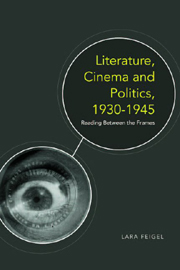Book contents
- Frontmatter
- Contents
- Acknowledgements
- List of Figures
- Introduction
- 1 Radical Cinema
- 2 Mass Observing: The 1930s Documentary Gaze
- 3 The Documentary Movement and Mass Leisure, 1930–1945
- 4 Camera Consciousness
- 5 Framing History: Virginia Woolf and the Politicisation of Aesthetics
- 6 ‘The savage and austere light of a burning world’: The Cinematic Blitz
- Afterword
- Endnotes
- Bibliography
- Index
2 - Mass Observing: The 1930s Documentary Gaze
Published online by Cambridge University Press: 12 September 2012
- Frontmatter
- Contents
- Acknowledgements
- List of Figures
- Introduction
- 1 Radical Cinema
- 2 Mass Observing: The 1930s Documentary Gaze
- 3 The Documentary Movement and Mass Leisure, 1930–1945
- 4 Camera Consciousness
- 5 Framing History: Virginia Woolf and the Politicisation of Aesthetics
- 6 ‘The savage and austere light of a burning world’: The Cinematic Blitz
- Afterword
- Endnotes
- Bibliography
- Index
Summary
In seeking to be at once invisible and present, the documentarists were destined to fail. They could not be simultaneously present and absent, any more than they could be objective witnesses of subjective scenes. The contradictions inherent in the documentary movement as a whole were encapsulated by Mass-Observation, which was unable to succeed on its own terms. Its aims were at once surrealist and anthropological, poetic and scientific. Jennings, Harrisson and Madge wanted to survey the masses empirically at the same time as they wanted to get to know them as individuals, creating a democracy of witnessing in which everyone could be an observer. They intended to analyse mass behaviour, using it to explain or even decode society, and to allow the voices of their subjects to speak for themselves.
The documentary writers and filmmakers, though generally less all-encompassing in their demands, were equally unsure about their relationship with their subjects and about the desirability of analysis within their work. The middle-class documentarists were unclear about whether they wanted to mingle with the workers or to observe them unseen. Part of the hope of the decade lay in thinking that it might be possible to join the working class. But even before Orwell chastised them for their boy scout idealism, Auden, Isherwood and Spender were ruefully aware of their privileged vantage point.
- Type
- Chapter
- Information
- Literature Cinema and Politics 1930–1945Reading Between the Frames, pp. 63 - 97Publisher: Edinburgh University PressPrint publication year: 2010



